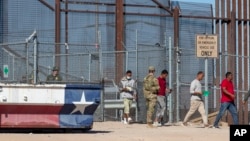Hundreds of troops who were deployed to the United States border with Mexico earlier this year as the government ended pandemic-related asylum restrictions are now returning home.
Department of Defense spokesman Lieutenant Colonel Devin Robinson told VOA on Wednesday that 1,100 active-duty troops have already started moving out after helping U.S. Customs and Border Patrol agents for the last three months with administrative tasks such as data entry, warehouse duties and detection and monitoring support.
In May, Secretary of Defense Lloyd Austin ordered the deployment of 1,500 active-duty troops to the border for a 90-day mission to assist border patrol agents. The government anticipated a surge in border crossings, and the goal of the troops, according to U.S. officials, was to free up Customs and Border Protection personnel so that they could serve in the field.
At the time, illegal border crossings were swiftly escalating, and officials were concerned that crossings could further increase with the May 23 expiration date of Title 42, a border policy that blocked migrants, including asylum seekers, from entering the United States due to COVID-19.
But in June, the number of crossings fell to the lowest since President Joe Biden took office, according to the White House.
For 1,100 of those troops, their mission officially ends on August 8. Last month, Austin extended the mission for the remaining approximately 400 active-duty troops through August 31, according to Robinson.
The current troop departures do not include any of the additional 2,300 National Guard troops serving at the border in similar supporting roles, according to National Guard chief Gen. Dan Hokanson. According to the National Guard, other units will be rotated into the region to replace them when their deployments end.
Officials say Austin wants the Department of Homeland Security to stop continually relying on military troops to help with border protection. Austin stipulated in his previous agreement to send National Guard troops to the border through October 1 that the Department of Homeland Security had to work with the White House and Congress to develop a plan to fund shortfalls in staffing.








